关于fish
- 格式:doc
- 大小:14.50 KB
- 文档页数:2
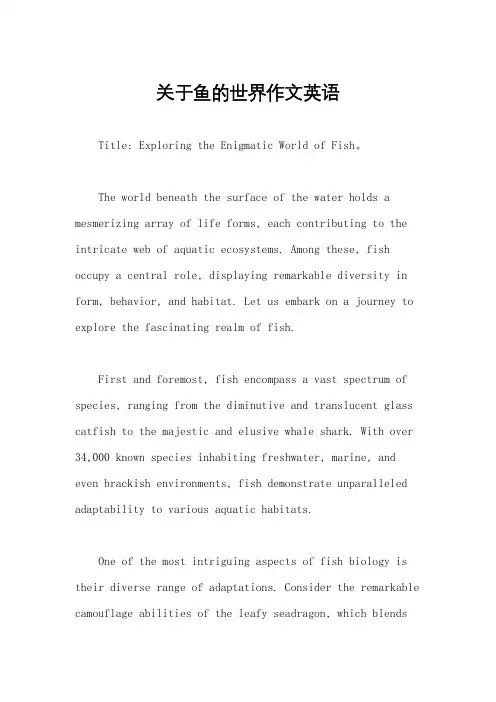
关于鱼的世界作文英语Title: Exploring the Enigmatic World of Fish。
The world beneath the surface of the water holds a mesmerizing array of life forms, each contributing to the intricate web of aquatic ecosystems. Among these, fish occupy a central role, displaying remarkable diversity in form, behavior, and habitat. Let us embark on a journey to explore the fascinating realm of fish.First and foremost, fish encompass a vast spectrum of species, ranging from the diminutive and translucent glass catfish to the majestic and elusive whale shark. With over 34,000 known species inhabiting freshwater, marine, and even brackish environments, fish demonstrate unparalleled adaptability to various aquatic habitats.One of the most intriguing aspects of fish biology is their diverse range of adaptations. Consider the remarkable camouflage abilities of the leafy seadragon, which blendsseamlessly into its surroundings, or the bioluminescent displays of deep-sea anglerfish, used to attract prey in the darkness of the abyssal depths. These adaptations highlight the ingenuity of nature in equipping fish with the tools necessary for survival in their respective environments.Furthermore, the behavior of fish showcases a rich tapestry of social interactions, communication strategies, and reproductive rituals. From the intricate courtship dances of tropical reef fish to the cooperative hunting techniques employed by certain species of sharks, fish exhibit complex behaviors that rival those of terrestrial animals. Studying these behaviors not only provides insight into the lives of fish but also offers valuable lessons in ecology and animal behavior.In addition to their biological significance, fish hold immense cultural and economic importance for humansocieties around the world. For millennia, fish have served as a vital source of sustenance for coastal communities and inland populations alike, providing essential nutrients andprotein to billions of people. Moreover, the fishingindustry supports millions of livelihoods globally, contributing significantly to local economies and international trade.However, the conservation of fish and their habitats faces numerous challenges in the modern era. Overfishing, habitat destruction, pollution, and climate change pose existential threats to many fish species and the ecosystems they inhabit. Efforts to mitigate these pressures require international cooperation, innovative conservation strategies, and sustainable management practices to ensure the long-term viability of fish populations and the ecosystems they support.Despite these challenges, there is cause for optimismin the ongoing efforts to protect and preserve fishdiversity worldwide. Conservation initiatives, such as marine protected areas, sustainable fisheries management, and community-based conservation projects, offer hope for the future of fish and their habitats. By raising awareness, promoting responsible stewardship, and fostering a deeperappreciation for the wonders of the aquatic world, we can work together to safeguard the rich legacy of fish for generations to come.In conclusion, the world of fish is a captivating realm teeming with diversity, complexity, and beauty. From the depths of the ocean abyss to the tranquil waters of freshwater rivers and lakes, fish occupy a unique and irreplaceable niche in the tapestry of life on Earth. By exploring and cherishing this extraordinary world, we gain not only a deeper understanding of nature but also a profound appreciation for the interconnectedness of all living beings. Let us continue to celebrate and protect the wondrous diversity of fish, ensuring a brighter future for our planet and all its inhabitants.。
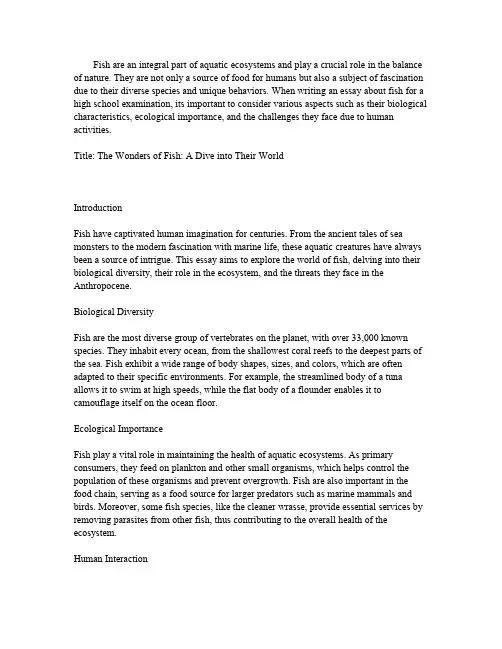
Fish are an integral part of aquatic ecosystems and play a crucial role in the balance of nature.They are not only a source of food for humans but also a subject of fascination due to their diverse species and unique behaviors.When writing an essay about fish for a high school examination,its important to consider various aspects such as their biological characteristics,ecological importance,and the challenges they face due to human activities.Title:The Wonders of Fish:A Dive into Their WorldIntroductionFish have captivated human imagination for centuries.From the ancient tales of sea monsters to the modern fascination with marine life,these aquatic creatures have always been a source of intrigue.This essay aims to explore the world of fish,delving into their biological diversity,their role in the ecosystem,and the threats they face in the Anthropocene.Biological DiversityFish are the most diverse group of vertebrates on the planet,with over33,000known species.They inhabit every ocean,from the shallowest coral reefs to the deepest parts of the sea.Fish exhibit a wide range of body shapes,sizes,and colors,which are often adapted to their specific environments.For example,the streamlined body of a tuna allows it to swim at high speeds,while the flat body of a flounder enables it to camouflage itself on the ocean floor.Ecological ImportanceFish play a vital role in maintaining the health of aquatic ecosystems.As primary consumers,they feed on plankton and other small organisms,which helps control the population of these organisms and prevent overgrowth.Fish are also important in the food chain,serving as a food source for larger predators such as marine mammals and birds.Moreover,some fish species,like the cleaner wrasse,provide essential services by removing parasites from other fish,thus contributing to the overall health of the ecosystem.Human InteractionThe relationship between humans and fish is complex and multifaceted.On one hand, fish have been a staple food source for humans for millennia,providing essential nutrients such as protein and omega3fatty acids.On the other hand,human activities have had a profound impact on fish populations.Overfishing,habitat destruction,and pollution have led to the decline of many fish species,some of which are now endangered or extinct.Conservation EffortsRecognizing the importance of fish to both ecosystems and human societies,conservation efforts have been implemented worldwide.These include the establishment of marine protected areas,the regulation of fishing practices,and the restoration of habitats. Education and awareness campaigns also play a crucial role in promoting sustainable fishing practices and the protection of marine life.ConclusionIn conclusion,fish are not only fascinating creatures in their own right but also essential components of the planets biodiversity.Their survival is intertwined with our own,and it is our responsibility to ensure that future generations can continue to marvel at the wonders of the underwater world.By understanding the importance of fish and taking action to protect them,we can help preserve the delicate balance of our planets ecosystems.When writing an essay for a high school examination,its crucial to provide a clear thesis statement,support your arguments with evidence,and maintain a logical flow of ideas. Additionally,ensure that your essay is wellorganized,with a strong introduction,body paragraphs that explore different aspects of the topic,and a conclusion that summarizes your main points.Remember to proofread your work for grammar,spelling,and punctuation errors to ensure clarity and coherence.。
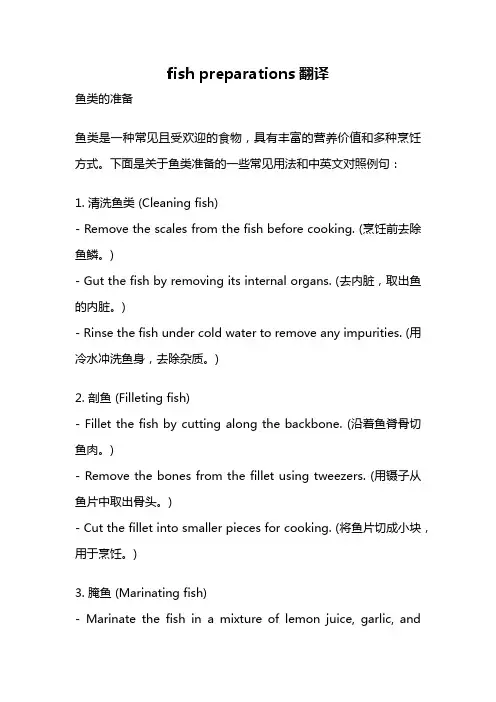
fish preparations翻译鱼类的准备鱼类是一种常见且受欢迎的食物,具有丰富的营养价值和多种烹饪方式。
下面是关于鱼类准备的一些常见用法和中英文对照例句:1. 清洗鱼类 (Cleaning fish)- Remove the scales from the fish before cooking. (烹饪前去除鱼鳞。
)- Gut the fish by removing its internal organs. (去内脏,取出鱼的内脏。
)- Rinse the fish under cold water to remove any impurities. (用冷水冲洗鱼身,去除杂质。
)2. 剖鱼 (Filleting fish)- Fillet the fish by cutting along the backbone. (沿着鱼脊骨切鱼肉。
)- Remove the bones from the fillet using tweezers. (用镊子从鱼片中取出骨头。
)- Cut the fillet into smaller pieces for cooking. (将鱼片切成小块,用于烹饪。
)3. 腌鱼 (Marinating fish)- Marinate the fish in a mixture of lemon juice, garlic, andherbs. (将鱼浸泡在柠檬汁、大蒜和香草的混合物中。
)- Let the fish marinate in the refrigerator for at least 30 minutes. (让鱼在冰箱中腌制至少30分钟。
)- The marinated fish will have a tangy and flavorful taste. (腌制的鱼会有一种酸酸的、美味的味道。
)4. 炸鱼 (Frying fish)- Coat the fish with flour or breadcrumbs before frying. (在炸之前用面粉或面包糠包裹鱼。
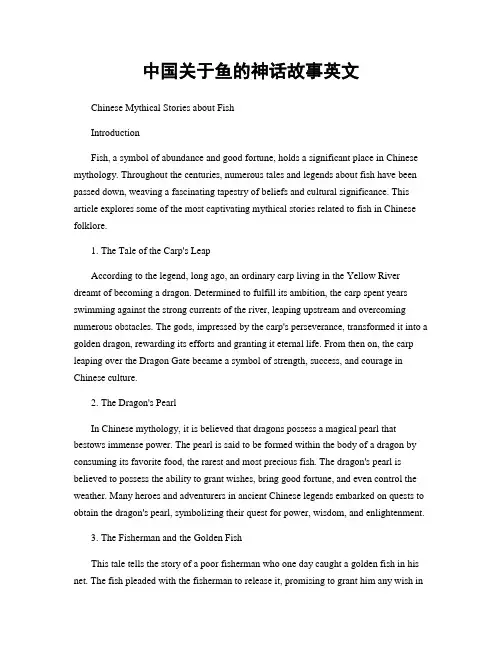
中国关于鱼的神话故事英文Chinese Mythical Stories about FishIntroductionFish, a symbol of abundance and good fortune, holds a significant place in Chinese mythology. Throughout the centuries, numerous tales and legends about fish have been passed down, weaving a fascinating tapestry of beliefs and cultural significance. This article explores some of the most captivating mythical stories related to fish in Chinese folklore.1. The Tale of the Carp's LeapAccording to the legend, long ago, an ordinary carp living in the Yellow River dreamt of becoming a dragon. Determined to fulfill its ambition, the carp spent years swimming against the strong currents of the river, leaping upstream and overcoming numerous obstacles. The gods, impressed by the carp's perseverance, transformed it into a golden dragon, rewarding its efforts and granting it eternal life. From then on, the carp leaping over the Dragon Gate became a symbol of strength, success, and courage in Chinese culture.2. The Dragon's PearlIn Chinese mythology, it is believed that dragons possess a magical pearl that bestows immense power. The pearl is said to be formed within the body of a dragon by consuming its favorite food, the rarest and most precious fish. The dragon's pearl is believed to possess the ability to grant wishes, bring good fortune, and even control the weather. Many heroes and adventurers in ancient Chinese legends embarked on quests to obtain the dragon's pearl, symbolizing their quest for power, wisdom, and enlightenment.3. The Fisherman and the Golden FishThis tale tells the story of a poor fisherman who one day caught a golden fish in his net. The fish pleaded with the fisherman to release it, promising to grant him any wish inreturn. The kind-hearted fisherman, grateful for catching such a rare and extraordinary creature, released the golden fish back into the water. To his surprise, the fisherman's modest fishing village transformed into a prosperous town, filled with abundant resources and peaceful harmony. This story emphasizes the ideals of compassion, altruism, and the belief in unexpected blessings.4. The Legend of Yu the GreatYu the Great, a legendary Chinese hero and ruler, played a central role in controlling the Great Flood, one of the most significant events in Chinese mythology. According to the legend, Yu was the son of a fisherman who learned from the wisdom of the fish in the rivers and lakes. By closely observing their behavior, he anticipated the coming flood and developed effective strategies to guide the water's flow, saving countless lives and bringing stability to the land. This story emphasizes the importance of nature's lessons and the harmony between humans and the natural world.ConclusionFish have always held a special place in Chinese mythology, representing various virtues and embodying cultural beliefs. The tales discussed above offer insights into the significant role fish play in Chinese folklore, highlighting themes of perseverance, power, compassion, and wisdom. The rich tapestry of mythical stories about fish not only entertains but also offers valuable lessons for generations to come, inviting us to appreciate the profound cultural heritage and wisdom of the Chinese civilization.。
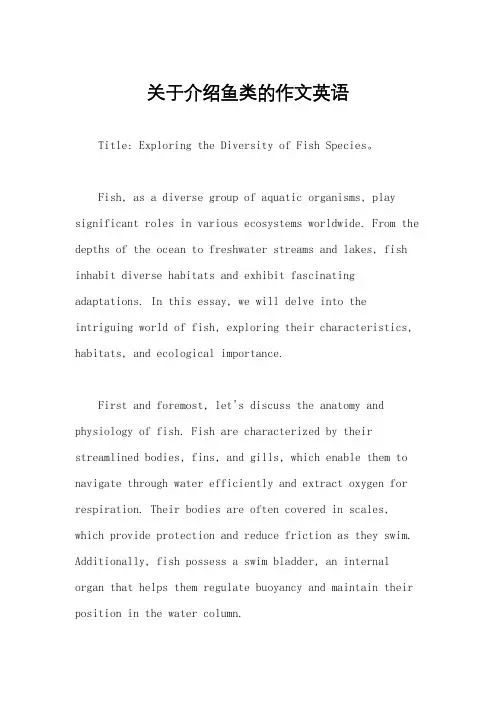
关于介绍鱼类的作文英语Title: Exploring the Diversity of Fish Species。
Fish, as a diverse group of aquatic organisms, play significant roles in various ecosystems worldwide. From the depths of the ocean to freshwater streams and lakes, fish inhabit diverse habitats and exhibit fascinating adaptations. In this essay, we will delve into the intriguing world of fish, exploring their characteristics, habitats, and ecological importance.First and foremost, let's discuss the anatomy and physiology of fish. Fish are characterized by their streamlined bodies, fins, and gills, which enable them to navigate through water efficiently and extract oxygen for respiration. Their bodies are often covered in scales, which provide protection and reduce friction as they swim. Additionally, fish possess a swim bladder, an internal organ that helps them regulate buoyancy and maintain their position in the water column.One of the most remarkable aspects of fish is their incredible diversity. With over 34,000 known species, fish exhibit a wide range of shapes, sizes, and behaviors. From the colossal whale shark to the tiny goby, fish speciesvary greatly in their appearance and lifestyle. Some fish, like the colorful angelfish found in coral reefs, display striking patterns and vibrant hues, while others, such asthe well-camouflaged flounder, blend seamlessly into their surroundings.Fish inhabit a multitude of aquatic environments, ranging from freshwater rivers and lakes to the vast expanses of the ocean. Each habitat presents its own set of challenges and opportunities for fish survival. For example, freshwater fish must contend with fluctuating water levels, temperature variations, and competition from other species. In contrast, marine fish face threats such as predation, pollution, and habitat destruction.Within these diverse habitats, fish play vital roles in maintaining ecosystem balance. As both predators and prey,fish help regulate populations of other organisms and contribute to the flow of energy within food webs. Additionally, many fish species serve as indicators of environmental health, with declines in fish populations often signaling underlying ecosystem issues.Furthermore, fish hold cultural and economic significance for human societies around the world. For centuries, fish have provided a crucial source of food and livelihood for millions of people engaged in fishing and aquaculture industries. Moreover, fish are valued for their recreational opportunities, with activities such as sport fishing attracting enthusiasts of all ages.In recent years, however, fish populations have come under increasing pressure from human activities such as overfishing, habitat destruction, and climate change. These threats pose significant challenges to the sustainability of fish stocks and the health of aquatic ecosystems. Addressing these challenges requires concerted efforts to implement effective conservation measures, promote sustainable fishing practices, and mitigate the impacts ofclimate change on fish habitats.In conclusion, fish are remarkable creatures that inhabit a vast array of aquatic environments, displaying incredible diversity in their morphology, behavior, and ecology. From the smallest minnow to the largest whale shark, fish captivate our imagination and remind us of the intricate web of life that sustains our planet. By understanding and appreciating the importance of fish, we can work towards ensuring their conservation and the preservation of our planet's aquatic ecosystems for future generations.。

FISH技术FISH技术:荧光标记的原位杂交技术1974年Evans首次将染色体显带技术和染色体原位杂交联合应用,提高了定位的准确性。
20世纪70年代后期人们开始探讨荧光标记的原位杂交,即FISH技术。
1981年Harper 成功地将单拷贝的DNA序列定位到G显带标本上,标志着染色体定位技术取得了重要进展。
20世纪90年代,随着人类基因组计划的进行,由于绘制高分辨人类基因组图谱的需要,FISH 技术得到了迅速的发展和广泛应用。
1.原理FISH(fluorescence in situ hybridization)技术是一种重要的非放射性原位杂交技术。
它的基本原理是:如果被检测的染色体或DNA纤维切片上的靶DNA与所用的核酸探针是同源互补的,二者经变性-退火-复性,即可形成靶DNA与核酸探针的杂交体。
将核酸探针的某一种核苷酸标记上报告分子如生物素、地高辛,可利用该报告分子与荧光素标记的特异亲和素之间的免疫化学反应,经荧光检测体系在镜下对待测DNA进行定性、定量或相对定位分析。
2.实验流程FISH样本的制备→探针的制备→探针标记→杂交→染色体显带→荧光显微镜检测→结果分析。
3.特点原位杂交的探针按标记分子类型分为放射性标记和非放射性标记。
用同位素标记的放射性探针优势在于对制备样品的要求不高,可以通过延长曝光时间加强信号强度,故较灵敏。
缺点是探针不稳定、自显影时间长、放射线的散射使得空间分辨率不高、及同位素操作较繁琐等。
采用荧光标记系统则可克服这些不足,这就是FISH技术。
FISH技术作为非放射性检测体系,具有以下优点:1、荧光试剂和探针经济、安全;2、探针稳定,一次标记后可在两年内使用;3、实验周期短、能迅速得到结果、特异性好、定位准确;4、FISH可定位长度在1kb的DNA序列,其灵敏度与放射性探针相当;5、多色FISH通过在同一个核中显示不同的颜色可同时检测多种序列;6、既可以在玻片上显示中期染色体数量或结构的变化,也可以在悬液中显示间期染色体DNA的结构。
关于fish
关于fish关于fish
提起fish,它给人们的第一印象便是指“鱼”,实际上它的用法并非如此简单。
fish用作可数名词指“鱼的条数”时单数和复数形式相同(twofish两条鱼),指“鱼的种类”时复数形式才为fishes (twofishes两种鱼);fish用作不可数名词时无复数形式,应作“鱼肉”解(helpyourselftosomefish.随便吃些鱼。
);fish用作动词时,它的含义又与“钓(捕)鱼”有关(gofishing去钓鱼)。
在英语口语里,fish还常常被用来指“人”,类似于汉语里的“家伙、东西”等。
如:apoorfish(可怜虫),abigfish(大亨),acoolfish (无耻之徒),astrangefish(奇人、怪人),aloosefish(放荡鬼)等。
但必须注意的是,fish用来指人时形象虽然鲜明,但往往含有贬义。
由fish构成的习语也非常生动有趣。
如:fishintheair本意为“空中钓鱼”,喻指“方法(向)不对而达不到目的”,相当于汉语中的成语“缘木求鱼”。
又如:likeafishoutofwater喻指“如鱼离水、感到生疏”,feelthefishes喻指“葬身鱼腹;晕船”。
含fish的一些谚语更加赋有哲理性。
如:
1.neveroffertoteachfishtoswim.不要班门弄斧。
(原意为:决不要教鱼游泳。
)
2.thebestfishsmellbadwhentheyarethreedaysold.久居别家招人嫌。
(原意为:鱼过三天就要臭。
)
3.hewhowouldcatchfishmustnotmindgettingwet.不入虎穴,焉得虎子。
(原意为:捉鱼不要怕鞋湿。
)
4.there'sasgoodfishintheseaasevercameoutofit.纵然失去一个机会,不愁没有其他机会。
(原意为:海里的好鱼是取之不尽的。
)
关于fish 相关内容:。